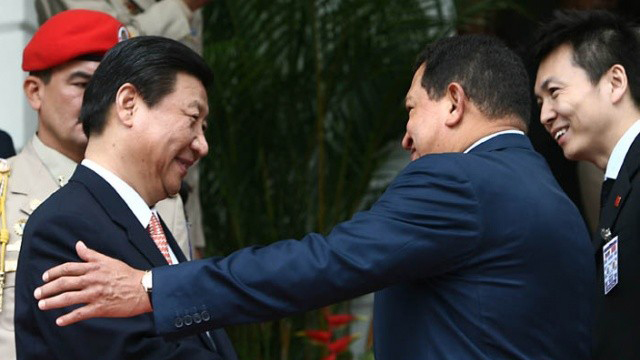During a state visit to the People’s Republic of China in September 2023, Venezuelan president, Nicolas Maduro met president Xi Jinping and both agreed to strengthen the relationship of their countries by establishing seven sub commissions to elevate it to the level of ‘all-weather strategic partnership’. This is the culmination of a relationship that began with president Hugo Chávez’s first visit to Beijing in 1999, the very first year of his presidency.
Chávez’s first visit went well beyond friendly diplomacy since Venezuela’s president and the then president of China, Jiang Zemin, signed fifteen cooperation and commercial agreements. This was followed by President Jiang’s visit to Venezuela in 2001. Trade between the two countries in 1998 amounted to a paltry USD 182.8 million, which would grow hundred-fold by the 21st century’s second decade.
In his 1999 visit Chávez described the People’s Republic as “a true model and example of mutual respect”, adding “we [in Venezuela] have developed an autonomous foreign policy, independent from any world power and on that, we resemble China.” After that, high officials from both governments would visit each other’s country to develop a commercial and political relationship, which has grown stronger ever since.
Whilst Hugo Chávez was president of Venezuela, he visited China in 2001, 2004, 2006, 2008, 2009, 2010, 2011, 2012, and 2013. President Maduro did so in 2013, 2015, 2018, 2021 and 2023. For their part, Chinese leaders also visited Venezuela: after Jiang Zemin’s 2001 visit, Xi Jinping (then vice-president) visited in 2009 and in 2013, president Hu Jintao planned a visit in 2010 (interrupted due an earthquake in China), and Xi Jinping, as president, visited in 2014.
This article, part one in a three-part series, by Francisco Dominguez—an expert on Latin American politics, National Secretary of the Venezuela Solidarity Campaign, and Friends of Socialist China advisory group member—endeavors to chart the evolution of the relationship between Bolivarian Venezuela and the People’s Republic of China and its significance for Latin America as a whole.
Being a consummate strategist, Hugo Chávez understood earlier than other Latin American left-wing leaders, the significance and weight of China in world politics and economics, especially, the rising Asian power’s commitment to build a multipolar world. Chávez, an avid reader, endowed with a formidable intellect, was also aware not only of the significance of the 1949 Chinese revolution and the leading role played by Mao Zedong, but also of Deng Xiaoping’s economic reform in bringing about China’s extraordinary economic development. He knew that given the affinities between the Bolivarian and Chinese revolutions, the People’s Republic was a friendly ally.
Chávez communicated as much to his host, China’s president Jiang Zemin, and to the people of China in his first visit to the People’s Republic in October 1999. During the visit he went to Mao’s Mausoleum and declared, “I have been a Maoist all my life”. The 1999 visit to China was part of a tour for markets for Venezuelan and potential commercial partners to help break the overwhelming economic dominance of the United States over Venezuela. The tour included visits to Hong Kong, Japan, South Korea, Malaysia, Singapore and the Philippines.
Though the tour produced positive results in all the other Asian countries, the outcome of his visit to China went well beyond all expectations: to the already existing eight cooperation agreements between Venezuela and China signed since Chávez coming to office in February 1999, his visit in October produced seven more covering the fields of energy, oil, credits to purchase agricultural machinery, investment, diplomacy and academia.
Chávez combined his strategic political audacity in promulgating an anti-neoliberal constitution in 1999, with a vigorously independent foreign policy seeking to establish strong links of every kind with the People’s Republic of China, as an alternative to Venezuela’s heavy dependence on the US. The Comandante knew Washington had activated all its resources aimed at ousting him and eliminating his government – perceived by the US as an abhorrent anomaly. Chávez’s political courage is even more impressive considering that in 1999, Latin America, with the exception of Cuba, was a sea of neoliberalism.
Washington’s relations with the People’s Republic had begun to sour because in 1996 Clinton had authorized a visit by Taiwan president, Lee Teng-hui, reversing a fifteen-year-old policy against granting visas to Taiwan’s leaders. Worse, in May 1999, NATO, during its war against Yugoslavia, had “accidentally” bombed the Chinese embassy in Belgrade killing three Chinese journalists. Though for Venezuela and China, the United States was an important trading partner, they both agreed to comprehensive levels of cooperation knowing that over time it would be viewed with hostility in Washington.
Hugo Chávez opened the gates and was a pioneer in the relations with the Peoples’ Republic of China for the rest of Latin America. Chávez was elected in 1999; the second left wing government in this ‘Pink Tide’ to be elected was Lula in 2002 in Brazil, who would be inaugurated in 2003. That is, four years later. Between 1999 and 2003, Chávez’s government faced intense US-led destabilization, which included right wing street violence, a worldwide media demonization campaign, national protests, economic sabotage, a short-lived coup d’état and a 64-day oil lockout that nearly brought about the country’s economic collapse. Though fully aware of this context, president Jiang Zemin paid a formal visit to Venezuela in 2001, occasion in which both countries decided to establish a “Strategic Association for Shared Development” and set up a High Level Chinese-Venezuelan Commission.





